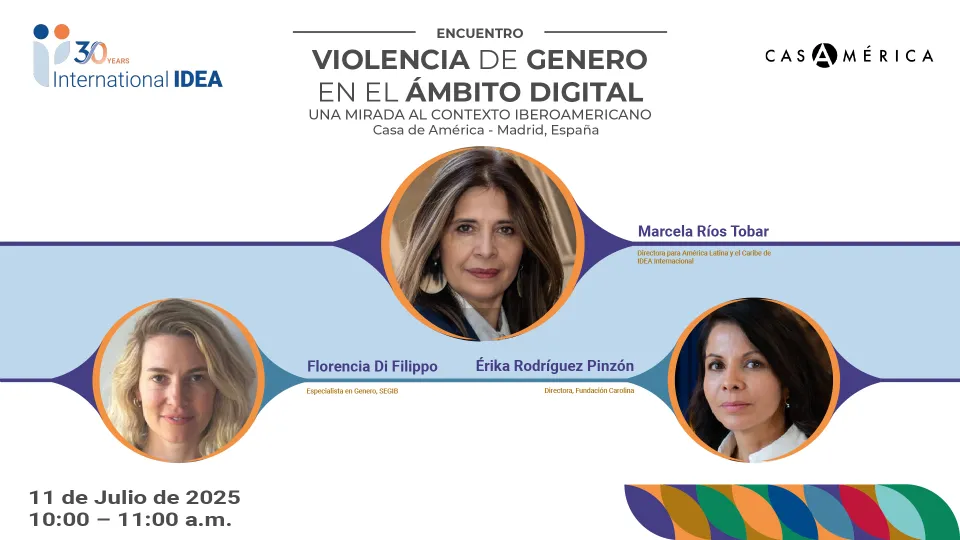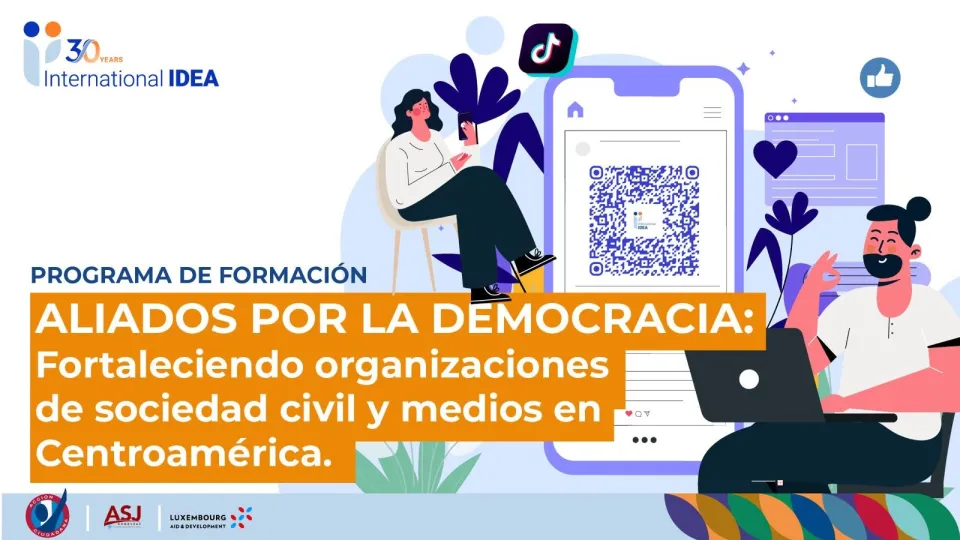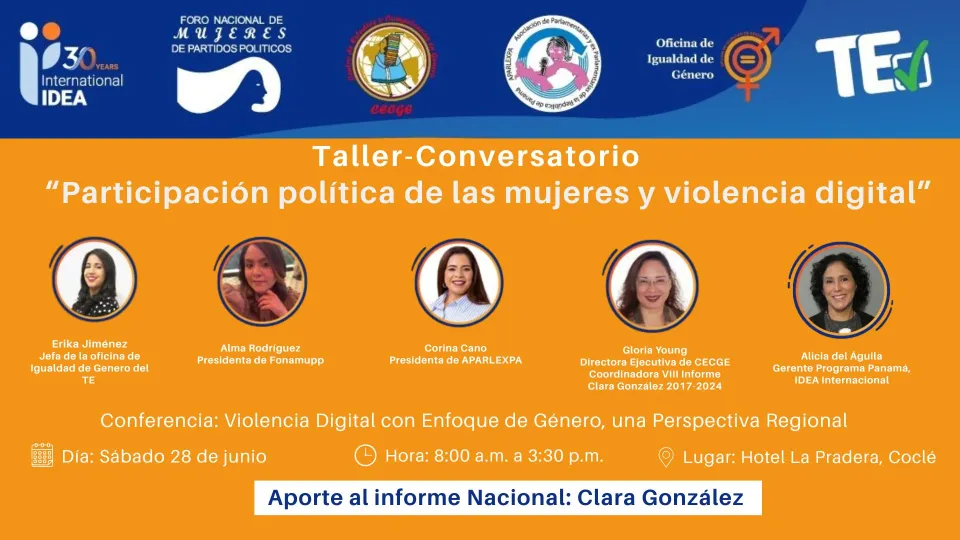Women are often marginalised from decision-making in conflict and transitional contexts. Despite evidence that women’s presence and participation lead to better and longer lasting outcomes for peace, they remain underrepresented in transitional governments and peacebuilding bodies.
Búsqueda
Region
Country
Type
On 21-22 April 2025, International IDEA held a two-day workshop in Baghdad to explore how Iraq’s information environment shapes the integrity of its electoral processes.
As part of its ongoing efforts to strengthen the digital protection of Libya’s electoral process and with the support of International IDEA, the High National Elections Commission (HNEC) has facilitated the establishment of the Digital Election Protection Network - the first of its kind in the country. Developed in coordination with various institutions and partners, this network aims to address digital threats that could undermine the credibility of the electoral process.
The fourth implementation event of the Libyan Core Group was held in Tripoli on 3–4 October 2024.
Libya's 2024 municipal council elections are a pivotal step in the nation's ongoing efforts to decentralize governance and enhance public services at the local level. Amidst the country's complex political and economic challenges, these elections play a key role in shaping a more responsive and accountable government.
The second implementation event of the Libyan core group took place in Tunis from 11 to 12 June 2024. To ensure broader country-wide representation, the group membership was expanded to include new participants from the east of Libya.
Female politicians and young women aspiring to join politics from 47 counties have received a five-day training from the 5th Women in Political Participation (WPP) Academy on how to enhance their political leadership skills, promote inclusivity in political participation and inspire young women to join politics.
The recently concluded fifth Women Political Participation (WPP) Academy by the Forum for Africa Women Educationalists (FAWE) was a residential five-day training. It targeted women who hold political positions in Kenya’s government, women who vied in the 2022 Kenyan general election, young women aspiring to join politics whose age bracket is between 18 to 35 years, and student leaders. The participants were drawn from the 47 counties within Kenya.
Between December 7th and 9th, 2023, International IDEA’s Tunis Office collaborated with the non-profit organization "The Model African Union" to organize a Model African Union event in Tunis, Tunisia. The event brought together 28 students from Tunisia and Sub-Saharan Africa, with a thematic focus on climate change and migration.
Join a Q&A meeting on Day 2 of the Summit on Wednesday, 28 February 2024, at 2 pm CET/8 am EST.
الحريات الفردية والفصل 55: هل من قراءة أخرى بعد؟ دراسة من المفروض أن تحين (تحدّث) كتاب الفصل 49 والحريات الفردية: هل من قراءة أخرى؟، والذي كان قد صدر ضمن إطار دستور 27 جانفي/يناير 2014، آخذاً بعين الإعتبار تغير السياق الدستوري وصدور دستور 25 جويلية/يوليو 2022.
In the age of social media, even small delivery mistakes can lead to the rapid spread of false information, emphasizing the importance of accuracy and transparency to rebuild and strengthen trust in the information ecosystem.
Any errors or misunderstandings in the electoral process can be swiftly magnified in the realm of social media. This situation not only raises concerns about the accuracy of information but also the potential spread of false narratives, speculation, and misinformation.
International IDEA’s new report titled “The Pros and Cons of the Regional Initiatives to Stop the War in Sudan” sheds light on the ongoing conflict in Sudan. The report analysis, examines and addresses the root causes of the conflict in Sudan.
أصدرت المؤسسة الدولية للديمقراطية والانتخابات سنة ٢٠٢١ مجموعة من الأدلة العملية حول الفصل ٤٩ من دستور ٢٧ جانفي/يناير ٢٠١٤ لفائدة مختلف الأطراف المعنية بتطبيق هذه المادة الجامعة التي وضعت الشروط والمعايير المتعلقة بالحد من الحقوق والحريات في الدستور التونسي. وتهدف هذه الأدلة إلى وضع منهجية واضحة ومبسطة لتطبيق مبدأ التناسب المكرس صلب هذا الفصل، كما تقترح آليات عملية لتفعيله تستجيب لخصوصيات مختلف الجهات المستهدفة: السلطة التشريعية، السلطة
إن قوات الأمن الداخلي هي أساسا جهاز مكلف بالسهر على احترام حقوق الإنسان التي تمثل حجر أساس كل مجتمع ديمقراطي. وبسبب دقة هذه المسؤولية، فإنها تحتاج إلى منهاج عمل يساعدها على الاتزان في استعمال القوة حين يقتضي الأمر اللجوء إليها وعلى التعامل القانوني السليم مع كل وضعية تنتجها مقتضيات ممارسة المهام الأمنية.
نشأت فكرة المرصد منذ سنة ٢٠١٩ في إطار مشروع المؤسسة الدولية للديمقراطية والانتخابات المتعلق بالمادة الجامعة من الدستور التونسي والذي تعمل عليه المؤسسة منذ سنة ٢٠١٩.
One of the particularities of what is currently being negotiated between Saudi Arabia and Ansar Allah is that the parties are contemplating establishing a revenue allocation mechanism in the absence of an overarching constitutional or political framework.
عملت المؤسسة الدولية للديمقراطية والانتخابات في عام ٢٠١٦ مع خبراء بارزين في القانون الدستوري على وضع منهجية جديدة لتقييم الدساتير. وتتألف المنهجية من تقييم ‘أداء’ الدستور المعني، وهذا يتضمن تحديد أهدافه والسعي للتأكد من تحقيقها بناء على بيانات مأخوذة من مصادر مختلفة. وقد طبقت المؤسسة تلك المنهجية منذ ذلك الحين على عدد من البلدان بالتعاون مع خبراء وشركاء محليين.


